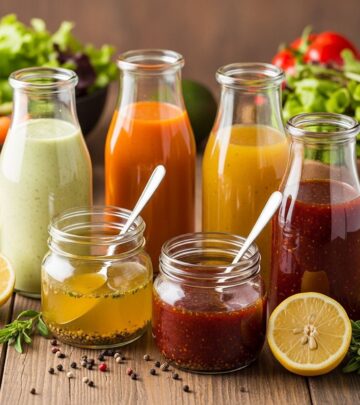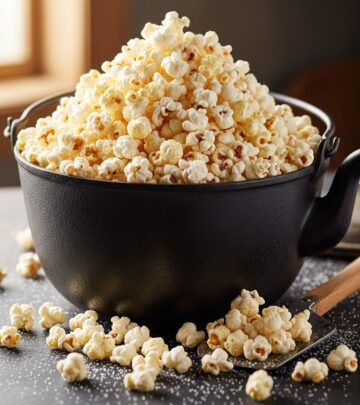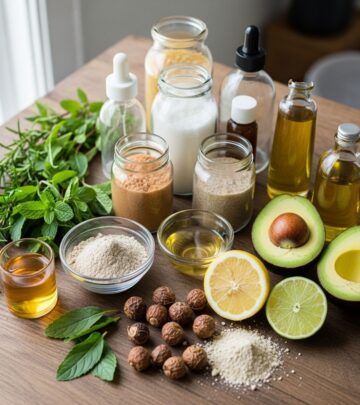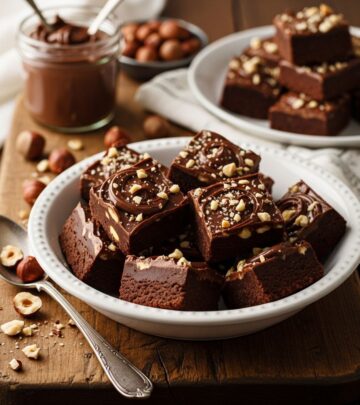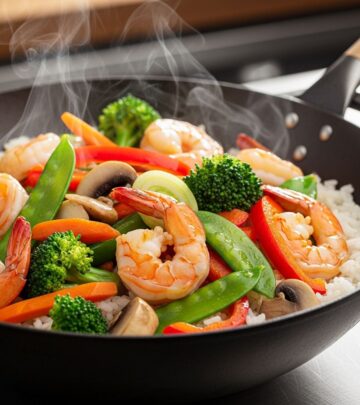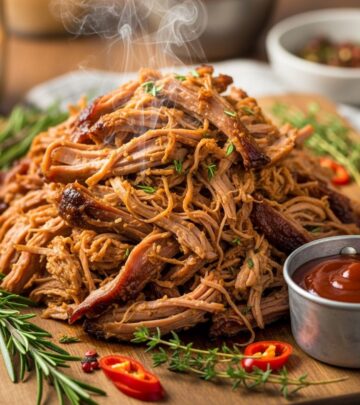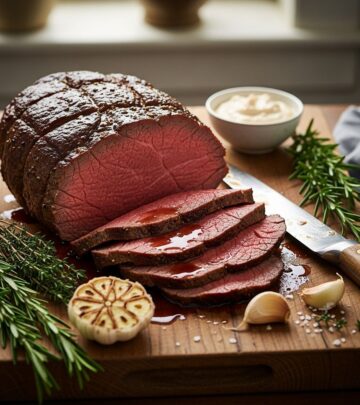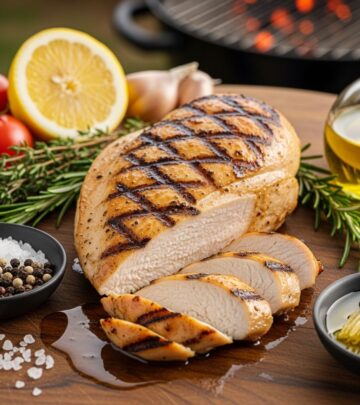Tandoori Grilled Salmon and Asparagus: An Easy Indian-Inspired Feast
A simple yogurt marinade brings vibrant spice and smoky char to every bite.
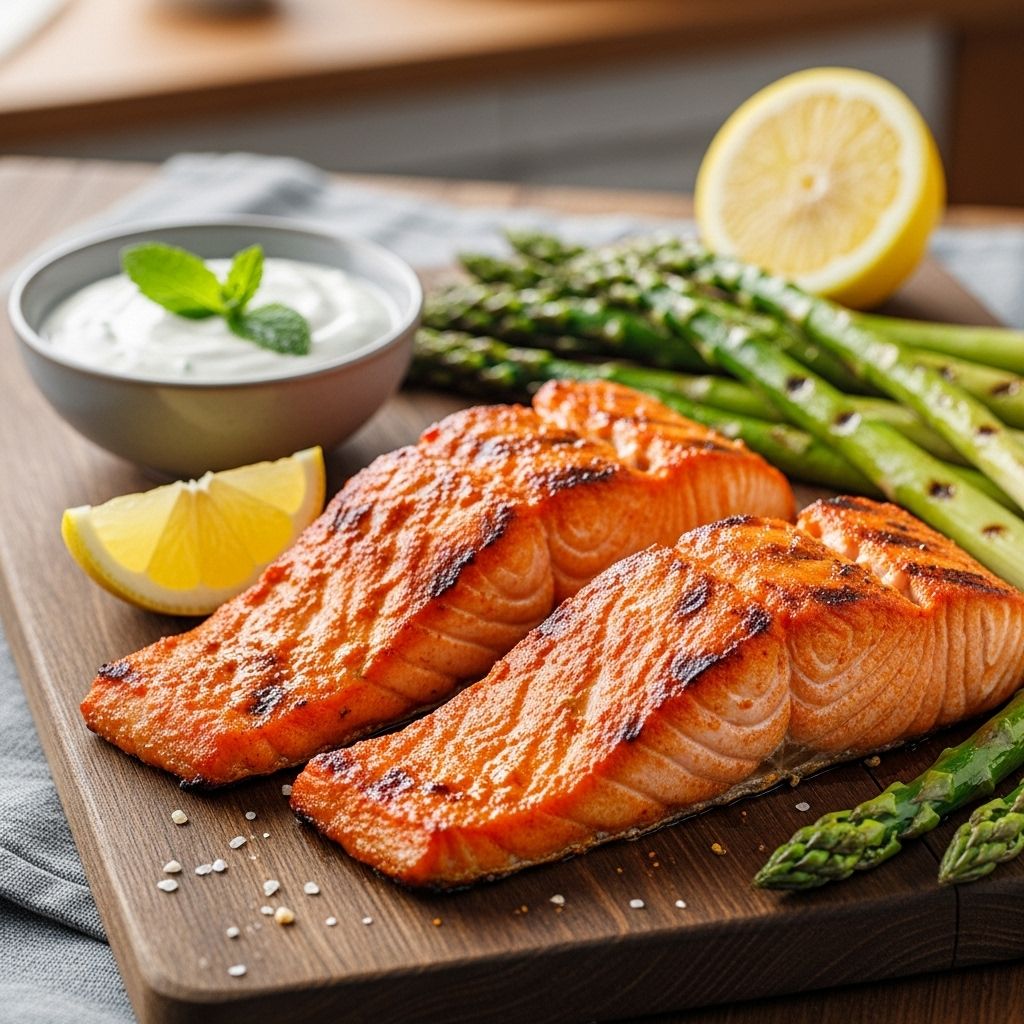
Tandoori Grilled Salmon and Asparagus: A Restaurant Experience at Home
If you crave the heady, aromatic spices and delicious char of Indian tandoori salmon but want an easy, wholesome meal that you can whip up on a weeknight—or impress with at a summer cookout—this tandoori grilled salmon and asparagus promises both flavor and convenience. Succulent salmon fillets and tender asparagus are slathered in a bold yogurt marinade infused with Indian spices, then seared or grilled for a restaurant-worthy meal in under 30 minutes.
Why This Recipe Works
- Simple, powerful marinade: Yogurt helps tenderize the salmon and carries the vibrant flavors of garam masala, fresh ginger, garlic, and chili.
- Quick marination: Just 15 minutes is enough for the spices to infuse the fish and vegetables, making this a realistic weeknight dinner.
- Minimal cleanup and effort: The marinade doubles for fish and veggies. Everything cooks together on the grill or under the broiler for easy cleanup.
- Healthy and balanced: Salmon and asparagus are nutrient-rich, and grilling brings out natural flavors without excess oil or heaviness.
- Versatile technique: Works with a grill, grill pan, or oven broiler. Swap in other quick-cooking veggies such as broccoli or bell peppers.
Ingredients
| Ingredient | Measurement |
|---|---|
| Plain yogurt | 3/4 cup (whole or low-fat) |
| Fresh ginger, grated | 1 tablespoon |
| Garlic, grated | 2 teaspoons (from 2 medium cloves) |
| Hot chili, sliced (optional) | 1/2 small |
| Garam masala | 2 teaspoons |
| Vegetable oil (plus extra for grill) | 1 tablespoon |
| Sea salt | To taste |
| Salmon fillets, skinless | 2 (about 6 ounces each) |
| Asparagus, trimmed | 1 bunch (about 12 spears) |
| Lemon wedges | For serving |
| Cilantro or parsley, torn (optional) | For garnish |
Step-By-Step Instructions
1. Prepare the Marinade
In a medium bowl, combine the yogurt, grated ginger, garlic, garam masala, chili (if using), vegetable oil, and a generous pinch of sea salt. Stir until fully mixed. The marinade should be thick and fragrant with a warm spiced aroma.
2. Marinate the Salmon and Asparagus
- Pat the salmon fillets dry with paper towels. Add them to the bowl and coat thoroughly with the marinade.
- Add the asparagus (or use broccoli spears as an alternative) to the marinade and toss gently to coat. If the bowl is too tight, use a rimmed plate or shallow dish.
- Cover and refrigerate for 15–30 minutes. Longer marination enhances flavor, but even a brief soak works thanks to the potent spices.
3. Preheat Your Grill or Broiler
- For outdoor grilling: Preheat grill to high and oil grates lightly to prevent sticking.
- For stovetop grilling: Heat a grill pan over high. Lightly oil with a paper towel dipped in vegetable oil.
- For broiling: Arrange rack 4–6 inches below the broiler. Preheat on high. Line sheet pan with parchment or foil for easy cleanup.
4. Cook the Salmon and Asparagus
- Remove excess marinade from salmon and asparagus (not all, just what’s clinging thickly). Reserve a small amount for basting if desired.
- Grill or broil the salmon until the exterior is charred and the center is medium to medium-well (translucent pink, but flaking), about 3–4 minutes per side. Avoid overcooking—salmon is at its best just barely cooked through.
- Grill or broil the asparagus at the same time, turning occasionally, until slightly charred and tender (about 5 minutes total).
- Add lemon wedges to the grill during the last minute for caramelized, smoky topping.
5. Serve
- Arrange the salmon and asparagus over a bed of warm rice (boil-in-a-bag basmati is a great shortcut, but any rice or grain will do).
- Sprinkle with torn cilantro or parsley, and serve with grilled or fresh lemon wedges for squeezing over the top.
- Accompany with salad or raita for a cooling side—try a quick cucumber-yogurt salad dressed with apple cider vinegar for tang and crunch.
Tips & Tricks for Success
- Don’t Over-Marinate: Salmon’s delicate texture doesn’t need hours; 15–30 minutes is optimal.
- Use Whole-Milk Yogurt: Whole-milk or full-fat yogurt results in a richer marinade, but low-fat works in a pinch.
- Mix Up the Veg: Substitute broccoli, bell peppers, zucchini, or green beans for seasonal variety.
- Blanch Tougher Veggies: If using broccoli or carrots, blanch for 2 minutes in salted water before marinating for even cooking and vibrant color.
- Rice Shortcuts: Boil-in-a-bag basmati or pre-cooked grains help turn this into a true 30-minute meal.
- Char for Smoky Flavor: Don’t be afraid of a good sear—charring is hallmark to tandoori cooking, echoing the effect of a traditional clay oven.
What Makes Tandoori Marinade Special?
Classic tandoori dishes are known for their blend of tangy yogurt, warming spices, and a touch of chili heat. The yogurt acts as both a tenderizer and carrier for the spice mix, which typically includes garam masala (coriander, cumin, cardamom, cinnamon, cloves, black pepper), often with fresh garlic and ginger. This simple blend delivers complexity and color, especially when marinated briefly and exposed to high heat on a grill or under a broiler.
Serving and Pairing Ideas
- Steamed or grilled asparagus adds freshness and crunch, perfectly complementing the rich salmon.
- Rice and flatbread: Serve over basmati rice, brown rice, or even with naan for a heartier meal.
- Sauces: Simple raita (yogurt with cucumber and mint), a squeeze of charred lemon, or a drizzle of extra yogurt marinade (cooked, not raw) provide additional coolness and zip.
- Salad: Try a crisp salad of raw shaved asparagus, rainbow carrots, and avocado with a lemony or yogurt-based dressing.
Nutritional Benefits
Salmon is a superb source of high-quality protein and heart-healthy Omega-3 fatty acids. It also contributes B vitamins and minerals such as selenium and potassium. Asparagus is low in calories, rich in fiber, vitamins A, C, K, and folate. The yogurt-based marinade adds protein and probiotics without excessive fat—especially if you choose whole-milk or low-fat yogurt. This combination makes for a meal that supports energy, muscle maintenance, and overall metabolic health.
Variations
- Change the fish: Try trout, cod, or even shrimp with the same marinade and cooking method for variety.
- Make it vegetarian: Omit the salmon and use thick slabs of paneer cheese, or marinate a medley of vegetables—such as cauliflower, mushrooms, and sweet potatoes.
- Add more vegetables: Bell peppers, red onions, and zucchini grill beautifully alongside the main ingredients.
- Ramp up the heat: Increase chili or add cayenne for a spicier kick, or use smoked paprika for extra depth.
Storing and Making Ahead
- Leftovers: Store cooked salmon and asparagus in an airtight container for up to 2 days. Reheat gently, or enjoy flaked salmon cold over salads or grain bowls.
- Make ahead: The marinade can be mixed up to two days in advance and stored refrigerated. Marinate salmon just before grilling for best texture.
Common Issues & Solutions
- Fish sticking to the grill: Oil the grates well and let the salmon develop a good sear before flipping.
- Marinade burning: Remove most excess marinade before grilling and use moderate heat if direct flare-ups are a problem.
- Dry salmon: Check doneness by eye and touch; salmon finishes quickly. Take off the heat as soon as the center is barely opaque.
FAQs
Q: Can I use Greek yogurt instead of plain regular yogurt?
A: Yes, Greek yogurt gives a thicker, slightly tangier marinade. You may want to thin it with a splash of milk or water for easier coating and more even charring.
Q: What if I don’t have garam masala?
A: You can substitute with a mix of ground coriander, cumin, cinnamon, black pepper, and a pinch of clove. Or try another favorite curry powder blend for a different flavor direction.
Q: How do I know when salmon is cooked through?
A: Salmon is perfectly cooked when the outside is charred and the center is just opaque and flakes with gentle pressure. A thermometer inserted should read 125–130°F (52–54°C) for medium.
Q: Can I make this on the stovetop without a grill?
A: Absolutely! Use a grill pan or a standard heavy skillet over high heat, or broil on a lined sheet pan in the oven.
Q: Is it necessary to marinate the asparagus or can I grill it plain?
A: The yogurt marinade gives the asparagus a lovely flavor and helps with charring, but you can certainly grill it simply with olive oil, salt, and pepper if you prefer.
Recipe Card
Tandoori Grilled Salmon and Asparagus
- Prep Time: 10 minutes
- Marinate: 15–30 minutes
- Cook Time: 10 minutes
- Yield: 2 servings
- Mix yogurt, ginger, garlic, chili, garam masala, vegetable oil, and salt in a bowl.
- Coat salmon and asparagus with the marinade and chill for 15–30 minutes.
- Preheat grill, grill pan, or broiler. Oil grates or pan.
- Remove most excess marinade and grill salmon 3–4 min per side; asparagus about 5 min total, until charred and tender.
- Serve immediately with rice and lemon wedges. Garnish with cilantro if desired.
Frequently Asked Questions (FAQs)
Q: Can I make this meal in advance for entertaining?
A: Yes, the marinade and prepping of vegetables can be done ahead. Grill or broil the salmon just before serving for best texture and flavor.
Q: What wines or beverages pair best?
A: Try aromatic white wines like Riesling or Gewürztraminer, crisp rosé, or even a citrusy pale ale. For non-alcoholic pairings, sparkling water with lemon or a yogurt lassi complements the spices well.
Q: Can I double or triple the recipe for a family meal?
A: Absolutely! Scale ingredients up as needed and cook in batches. Marinate extra fish and vegetables in a larger bowl or resealable bag.
Final Thoughts
This tandoori grilled salmon and asparagus recipe transforms weeknight ingredients into a vibrant Indian feast with just a handful of pantry staples, a little yogurt, and an adventurous spirit. Serve over rice, pair with fresh naan, and bask in the char and spice you’ve created—all in less time than it usually takes for takeout to arrive at your door.
References
Read full bio of medha deb

